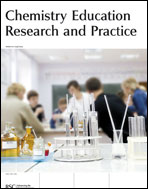Research-based development of a lesson plan on shower gels and musk fragrances following a socio-critical and problem-oriented approach to chemistry teaching
Abstract
A case is described of the development of a lesson plan for 10th grade (age range 15-16) chemistry classes on the chemistry of shower gels. The lesson plan follows a socio-critical and problem-oriented approach to chemistry teaching. This means that, aside from learning about the basic chemistry of the components making up modern shower gels in the lab, the students should become sensitised to the evaluation of the product, i.e. reflecting upon the use of potentially harmful ingredients. Therefore, the lesson plan also deals with the use of artificial musk fragrances in cosmetic products. The lesson plan was developed within the framework of a Participatory Action Research project. From the accompanying evaluation based on teachers' feedback, written student questionnaires and a study based on students’ group discussions, the lesson plan was refined in different cycles of development, testing, evaluation and reflection. In the end, the lesson plan was found to be highly feasible, motivating, and an initiator of intense discussions among pupils. The group discussions indicate that this teaching approach has the potential to promote a more balanced and well thought-out view among at least some of the students when dealing with aspects of consumer behaviour and reports in the media. The overall approach seems to be promising for promoting higher-order cognitive skills, i.e. reflection and evaluation within the framework of science, technology and society.
- This article is part of the themed collection: Evidentially-Based Curriculum Development

 Please wait while we load your content...
Please wait while we load your content...